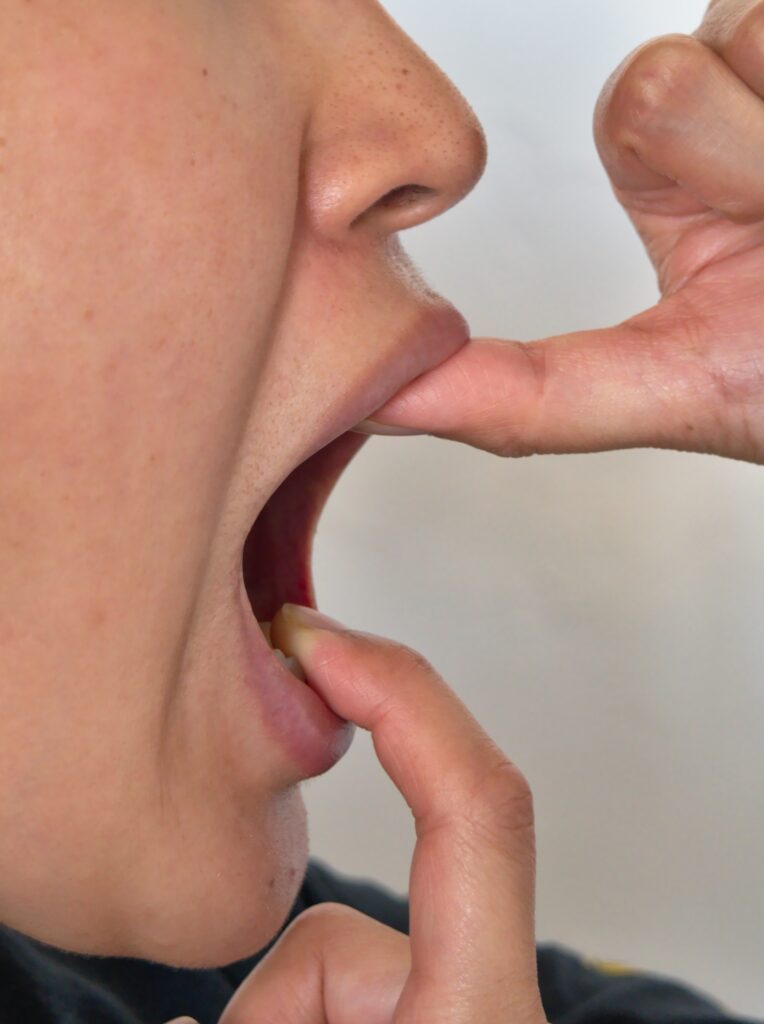
Reduced mouth opening, also known as limited mouth opening, can significantly impact one’s quality of life, affecting everyday activities such as eating, speaking, and even maintaining oral hygiene.
What is reduced mouth opening?
Reduced mouth opening refers to the limited ability to fully open the mouth. While it can occur temporarily due to conditions like jaw injury or surgery, it can also be a chronic issue stemming from various underlying causes.
Causes:
- Temporomandibular Joint (TMJ) Disorders: Dysfunction or inflammation of the TMJ can restrict jaw movement, leading to reduced mouth opening.
- Muscle Tightness or Spasms: Conditions such as muscle strain, bruxism (teeth grinding), or tetanus can cause the muscles around the jaw to tighten, resulting in restricted mouth opening.
- Oral Surgery or Trauma: Procedures involving the jaw, such as dental extractions or jaw surgery, can lead to temporary trismus due to postoperative swelling or scarring.
- Oral Cancerous conditions: In south Asian countries like India, OSMF (Oral Sub Mucous Fibrosis) is a common condition seen, which can happen due to betel nut chewing. Betel nut chewing can lead to fibrosis of the cheek tissue, which can lead to pre-cancerous condition, resulting in reduced mouth opening, over a period of time.
Effects of Reduced Mouth Opening:
The consequences of reduced mouth opening extend beyond physical discomfort, impacting various aspects of daily life.
- Difficulty Eating: Limited mouth opening can make it challenging to bite, chew, and swallow food, leading to nutritional deficiencies and weight loss.
- Impaired Speech: Restricted jaw movement can affect pronunciation, resulting in speech difficulties and communication barriers.
- Oral Hygiene Challenges: Difficulty accessing the entire oral cavity may hinder proper brushing, flossing, and dental care, increasing the risk of oral health problems such as cavities and gum disease.
- Psychological Impact: Chronic trismus can cause frustration, embarrassment, and social withdrawal, affecting mental well-being and self-esteem.
- Radiation Therapy: Patients undergoing radiation therapy for head and neck cancers may develop trismus as a side effect, due to damage to the surrounding tissues.
Treatment Options:
The management of reduced mouth opening depends on its underlying cause and severity. Some treatment options include:
- Physical Therapy: Jaw exercises and stretches prescribed by a physical therapist can help improve jaw mobility and reduce muscle tightness.
- Medications: Nonsteroidal anti-inflammatory drugs (NSAIDs) or muscle relaxants may be prescribed to reduce pain and inflammation associated with trismus.
- Heat Therapy: Applying warm compresses to the jaw muscles can help relax tense muscles and improve mouth opening.
- Dental Appliances: Mouth guards or splints may be recommended to prevent teeth grinding and reduce jaw muscle strain.
- Surgical Intervention: In severe cases or when conservative measures fail, surgical procedures are required. In severe cases of OSMF, surgical intervention is mandatory to restore mouth opening.
- Radiation Therapy Management: For individuals developing trismus as a side effect of radiation therapy, preventive measures such as early intervention with physical therapy or jaw exercises may help minimize its severity.
Reduced mouth opening is a complex condition that can significantly impair oral function and quality of life. Early recognition and appropriate management are essential for addressing the underlying causes and symptoms. At Teeth Care Centre, Dr. Pankti Patel, the best dentist for reduced mouth opening in Ahmedabad, always prefers a conservative approach for her patients, and guides them towards better oral hygiene.